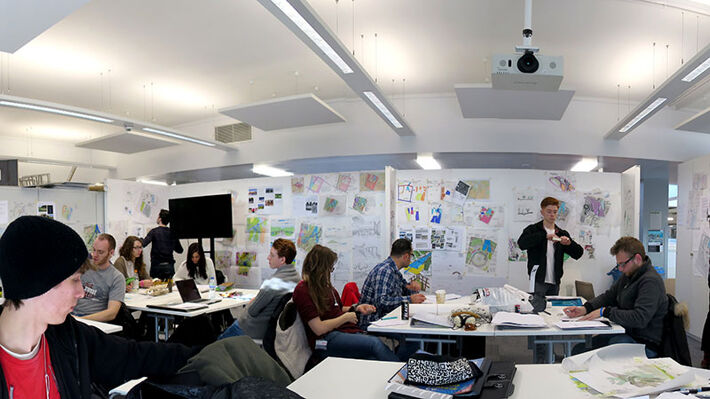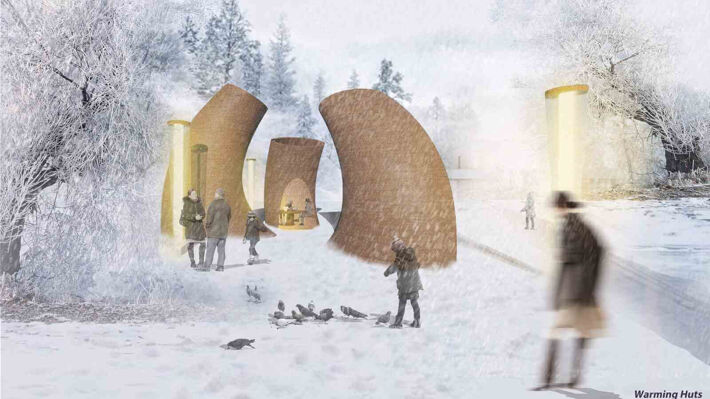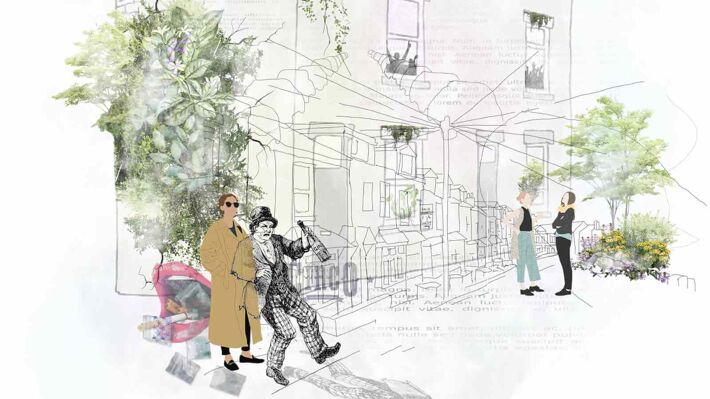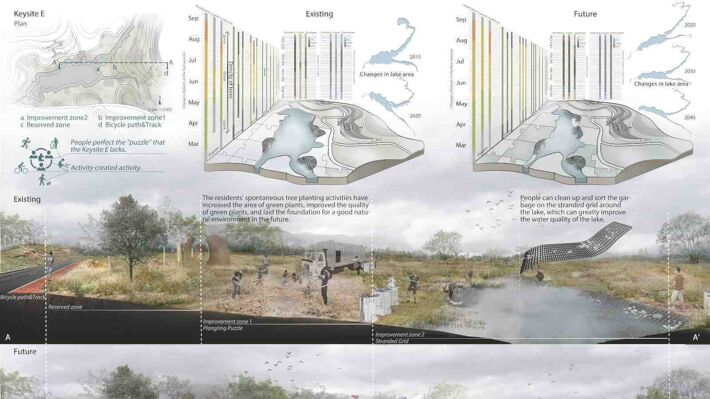Landscape Architecture with a Foundation Year - BA (Hons)
Currently viewing course to start in 2026/27 Entry.
Studying Landscape Architecture at BCU will equip you with the knowledge required to design and deliver projects when you graduate. We prioritise hands-on learning, allowing you to explore ideas and themes through a variety of design briefs. Landscape Architecture incorporates a range of skills from adjacent disciplines - from ecology, horticulture, policy and governance, to history and urban design. If you have interests in the arts or sciences, there is a place for you here.
- Level Foundation
- Study mode Full Time
- Award BA (Hons)
- Start date September 2026
- Fees View course fees
- Subject
- Location City Centre
This course is:
Open to International Students
Overview
Do you want to design the spaces that you live in? Landscape Architecture is the design of external spaces, as a combination of art, utility and natural systems. You could design parks, play areas, green spaces, a town square - or even a city! The role of a Landscape Architect is to design spaces that are suitable and inclusive for the user, so if you have ideas how to make the world around you a better place, this is something you can explore through this Landscape Architecture course.
As a Landscape Architect, you will respond to real world problems and challenges, such as improving air quality, water management, offset carbon footprint and reduce energy waste. The outdoor environment also has significant links to wellbeing and mental health – and you could be at the heart of designing sustainable urban living to benefit society for years to come.
During your time with us, you will engage with a range of design and research processes and consider the potential of working with nature and the built environment through the scales - from detailing intimate courtyards to regional spatial and ecological strategies.
About foundation courses
This four year degree course has been specifically designed to allow you to undertake additional level 3 study designed to ensure you are successful on your chosen degree.
After successful completion of your foundation year, you will have the flexibility to switch (should you wish to change direction) onto a number of related undergraduate degree options within the College of Architecture.
What's covered in this course?
Covering all aspects of landscape architecture, our course is fully recognised and accredited by the Landscape Institute (LI) and supported by a leading design team in its field.
You’ll work in a design studio culture, which mimics real-world creative practice for landscape architects and prepares you for your future career.
Experience on live local sites and project briefs in landscape studios will develop your design creativity and hone your professional practice skills. Placements and competitions will give you fantastic opportunities. There are also chances to compete for industry connected awards.
You’ll have the chance to be part of collaborative architecture and design initiatives within Architecture that give you the chance to work on a diverse variety of live projects. Past examples include: explorations in timber construction in the Wyre Forest, communicating with the public about what they really want from design for Stirchley High Street in Birmingham and implementation of a viewing structure to observe wetland ecology at Henbury Ponds.
You’ll also have the opportunity to attend lectures and take part in workshops from a large variety of international and award winning professionals. Previous guest speakers have included Martha Schwartz, Andrew Grant, Andrew Wilson, Jeppe Aagard Anderson, Neil Porter, Chris Beardshaw and Kim Wilkie.
You’ll be based in our multi-million pound City Centre Campus within our Parkside Building, where you will have access to digital studios and 3D design workshops. The proximity of the newly built Eastside Park provides inspiration to your studies, introducing a strong example of contemporary civic space and park design.
The University provides the support you need, while giving you a freedom that allows your projects to be as creative and individual… and the experience allowed me to gain employment at a landscape architect practice straight after my degree.
Jocelyn Bennett
Why Choose Us?
- The course is fully recognised and accredited by the Landscape Institute, allowing you to work towards full UK chartered membership.
- You’ll gain real industry experience, working on a wide range of briefs, from broad strategic scale, down to detailed design for construction.
- Our connections with the region’s best landscape architecture practices give you unrivalled work experience while studying and helps you secure employment after graduation.
- 91% of leavers from the School were in employment or further study, according to a recent survey.
- Birmingham City University is highly respected for its Architecture provision, having delivered the subject since 1909.
- Two-thirds of the impact of our research was judged to be very considerable (3*) or outstanding (4*) - REF2021
Open Days
Join us for an Open Day where you'll be able to learn about this course in detail, chat to students, explore our campus and tour accommodation. Booking isn't open for the next event yet. Register your interest, and we'll let you know as soon as booking goes live.
Next Open Day: Friday 26 June
Entry Requirements
Essential requirements
80 UCAS Tariff points. Learn more about UCAS Tariff points.
If you have a qualification that is not listed, please contact us.
Fees & How to Apply
UK students
Annual and modular tuition fees shown are applicable to the first year of study. The University reserves the right to increase fees for subsequent years of study in line with increases in inflation (capped at 5%) or to reflect changes in Government funding policies or changes agreed by Parliament. View fees for continuing students.
Award: BA (Hons)
Starting: Sep 2026
- Mode
- Duration
- Fees
- Full Time
- 4 years
- £9,535 in 2026/27 ✱ Important note for this price
- Apply via UCAS
(↩Back to price) * The Government is proposing to apply an inflationary increase to regulated tuition fees for 2026/27 and the University is planning on increasing fees to that maximum level once confirmed.
International students
Annual and modular tuition fees shown are applicable to the first year of study. The University reserves the right to increase fees for subsequent years of study in line with increases in inflation (capped at 5%) or to reflect changes in Government funding policies or changes agreed by Parliament. View fees for continuing students.
Award: BA (Hons)
Starting: Sep 2026
- Mode
- Duration
- Fees
- Full Time
- 4 years
- £18,570 in 2026/27
Guidance for UK students
UK students applying for most undergraduate degree courses in the UK will need to apply through UCAS.
The Universities and Colleges Admissions Service (UCAS) is a UK organisation responsible for managing applications to university and college.
Applying through UCAS
- Register with UCAS
- Login to UCAS and complete your details
- Select your course and write a personal statement
- Get a reference
- Pay your application fee and submit your application
You are not required to submit a portfolio for this course.
Course in Depth
Foundation year
The foundation year provides an opportunity to explore the exciting world of contemporary design through various scales and develop creative solutions, encapsulating Landscape Architecture, Architecture, Interior Architecture and Design, and Product and Furniture Design.
It provides a supported learning environment to explore conceptual ideas through to detailed design, mapping and modelling and is assessed through mini design-focussed projects and a specialised final project in a chosen field.
The foundation year is ideally suited to students who need to develop their design, drawing, technical and presentations skills before entering a BA course, or for those who have not yet decided which specific design discipline or career to pursue.
In order to complete this course a student must successfully complete all the following CORE modules (totalling 120 credits):
This module focuses on developing the 2D design skills and techniques required to communicate and visualise design concepts around space and form. You will work on a series of mini projects using predominantly manual techniques such as freehand sketching, technical drawing, and physical model-making. You will also be introduced to some digital techniques such as Photoshop and Desktop Publishing via InDesign.
This module is designed to develop your academic skills and make the transition to degree level study. It specifically focuses on your ability to critique, reflect and verbalise your thoughts and concepts through channels such as presentations, blogs and live journals.
You will learn how to use research methods to inform your practice and have the opportunity to advance your academic writing and referencing skills.
This module is designed to give you an introduction to the design processes used by the various disciplines and includes appraisal of design briefs, understanding context, design drivers, and the development of concepts and visuals through design feasibility studies. You will begin to understand how to turn your ideas into designs and the level required to reach a professional standard.
Underpinning the practice, you will explore and discuss fundamental concepts, particularly relating to human scale, ergonomics and anthropometrics, looking at design and its relationship to the physical aspects of the environment.
This module is designed to encourage you to make connections between theory and practice and engage further in critical analysis. You will explore the historical aspects across the two design disciplines (a major and minor) and scales and current practices.
You will further explore the use of precedent studies, which will provide you with the tools to respond to the challenges and changes in different environments and habitations.
This module focuses on developing presentation skills, from visual and graphic presentation techniques to pitching and presenting ideas.
You will have opportunities through workshops and online tutorials to learn Adobe Creative Suite and 3D software such as Sketch-up.
Hands on workshop practice will be introduced across a range of materials.
The aim of this module is to develop a concept design within your chosen discipline. You will document the design process, reflect on the experience and the final outcomes and the reasons for selecting your chosen field. The project will culminate in a comprehensive presentation, which will capture the whole design process via a design portfolio.
Year one
Laying the foundation for deeper understanding, this year covers a broad spread of study areas, moving seamlessly, connecting abstract design theory and consideration of global scale contexts, to micro-scale understanding of materials and technology.
Through this process, you will gain an understanding of the scope, scale and connectivity of landscape architecture, its transformative abilities and power to help ensure a global human future.
In order to complete this course you must successfully complete all the following CORE modules (totalling 120 credits):
Looking at the sources of inspiration within the international subject of Landscape Architecture, the module provides a broad introduction for you to begin to engage with the dynamics of a structured design process. Focus on each of the core principles will allow you to develop overall structural understanding of the subject, as well as the fundamental academic and design skill sets that will be required through the course and your future career, be that in Landscape Architecture, or a related field.
Developing a core transferable graphical skill set for Landscape Architecture and aligned, wider designed-environment industries. The module introduces industry standard methods and building on these to promote exploration of innovation and self-derived techniques in representing architectural space and site characteristics. Approaches introduced, will consider the benefits of physical and digital production methods, two dimensional and three dimensional representation, and frameworks for self-guided, work allocation, and time management in production.
Exploring the contextual framework within which the contemporary Landscape Architect practices: students will research and explore the scale, scope, and timeline of human impact on the Earth’s landscape and the impact of environmental factors on human development and systems.
Setting out a fundamental understanding of the broad design palette available to the Landscape Architect, including the key considerations for specifying and sourcing materials, systems and ecologies. Focus will be on curating the design fabric, aiming to emphasise character and function: through explorations in visual composition, colour, texture and form; to uncover deeper understandings on the emotive effects, cultural-historical references of association and the fundamental practical requirements and benefits of various design applications.
Moving up through scale, from the human perspective of 1:1, up to the common Landscape Architecture scales of 1:1000/1:1250, you will look at composition of increasingly large landscape components. As the scale range widens you observe the increasing considerations coming into play: physical and psychological interactions between the human and physical environment; a study of mass and void, of textural, sound, smell and colour qualities.
Year two
You'll develop professional approaches to design and construction in your second year.
You will develop connections between key design theories and real-world practice, through debate of current topics, placement study, collaborative projects (Co.LAB), and the exploration of two different multifaceted design processes.
Modules include:
In order to complete this course you must successfully complete all the following CORE modules (totalling 100 credits):
Building on an understanding of materiality, particularly from the previous year one modules, Inspiration, Components and Formation, this module develops your understanding of fully constructible, detail design and material specification. The outputs will be research led and focused on deepening and refining your understanding of how structure, technologies and living systems are integrated within real-world applications.
Developing a refined and deeper understanding of key socio-historical and artistic influences on contemporary Landscape Architecture. You will look at major movements, influences and their key proponents through specialised study areas and group debate. You will be encouraged to develop critical thinking in the review of a variety of theoretical positions, cultural beliefs and physical processes and historical context. The aim is to explore and debate on the common preconceptions and design practices of contemporary practice.
The purpose of this module is to enable you to develop professional attributes and subject skills through experience in the work place or a live case study, and to critically reflect upon your learning and future options in that context. You will normally be expected to arrange your own placement, with support from academic staff and BCU Careers. Typically, the placement duration is 1 or 2 weeks. This should be achieved in one block where possible. It is also possible to fulfil this module through a case study, via physical interview of a current practise if placement becomes unattainable.
The outcomes of this module will be supported with a lecture series and tutorial input in enabling an understanding of your industry in context, business operations, and industry expectations. In order to secure your placement you will undertake a pre-placement interview to understand your personal preferences, followed by collation of CV and on-line / off-line portfolio presence to substantiate your application.
The Urban Design module consists of a design project for redevelopment of a pivotal civic space network, with a focus on making dynamic, lively, places for people. You will develop proposals for a layered vision for reinvigorating and enlivening a ‘sense of place’ across a broad area, supporting the masterplan design/redesign of one key plaza, with multiple designed interventions for improving use and local identity.
Designed Ecologies is an exploration of multi-layered systems, incorporating and integrating social and ecological components within design of space. You will undertake a design project working down from a strategic level of green-network or parkland landscape, moving down into detail design for enhancing specific ecology and linking to visitor experience and resource production.
In order to complete this course a student must successfully complete at least 20 credits from the following list of OPTIONAL modules.
The module is an opportunity to learn and critically reflect on the skills of collaboration by enabling you to create an interdisciplinary project with students from complementary disciplines, or with academic staff.
Collaboration is a vital employability skill within the Creative Industries and this module allows you to develop these skills, making use of University facilities and with the support of academic staff. Within this module framework, several kinds of collaborative opportunities are available. For example, with the approval of your supervisor, you can determine a project based on your own interests; your supervisor may set you a predetermined project to enable you to work with other students in a way that is appropriate to your subject area; or there may be opportunities for you to collaborate with staff on research projects. In all cases, you must apply your subject skills to an interdisciplinary project which will be agreed in advance with your supervisor.
This module provides an opportunity for you to apply your knowledge and skills to an external, professional brief. The brief will be set by an external client/ agency, in consultation with your supervisor, and it could be a ‘real life’ problem to be solved, or a simulation. It is an opportunity for you to engage in a professional manner with an aspect of your subject area, which contributes to the development of employability skills within the supportive infrastructure of the University. Where appropriate, the project may involve interdisciplinary collaboration with students from other courses. In this way, it reflects the collaborative, flexible nature of employment within the Creative Industries.
All core modules are guaranteed to run. Optional modules will vary from year to year and the published list is indicative only.
Professional Placement Year
In order to qualify for the awards with Professional Placement, a student must successfully complete all of the modules listed above as well as the following Level 5 module.
This module is designed to provide you with the opportunity to undertake a credit bearing, 40- week Professional Placement as an integral part of your Undergraduate Degree. The purpose of the Professional Placement is to improve your employability skills which will, through the placement experience, allow you to evidence your professional skills, attitudes and behaviours at the point of entry to the postgraduate job market. Furthermore, by completing the Professional Placement, you will be able to develop and enhance your understanding of the professional work environment, relevant to your chosen field of study, and reflect critically on your own professional skills development within the workplace.
Year three
Through guided but self-directed investigations, you will define your own academic pathway.
Built on research and led via creative but pragmatic exploration in design, you will successfully communicate connections between theory, contextual analysis, project brief, conceptual proposals, design development and design detail, to produce a broad-scale, multi-layered design project.
In order to complete this course a student must successfully complete all the following CORE modules (totalling 120 credits)
The purpose of the module is to enable you to undertake a sustained, in-depth and theoretically informed research project exploring an area that is of personal interest to you. It is important that we can support you appropriately, so you will be guided towards choosing a research topic which is relevant to your discipline and in which your lecturers have expertise. The outcome may take the form of a written dissertation or a practice-based portfolio.
Building from the Praxis approach utilised within the College of Architecture, this module completes the conceptual thread of modules which connect a Professional practice suite through from Skills and Praxis, developing and integrating industry aligned skills and approaches, preparing you for entry into competitive professional contexts after study. A fundamental aspect of the module is to increase your self-reliance and confidence in communicative approaches and contextual understanding of their application.
You will start by defining a project site at strategic scale, which aligns to a sophisticated set of aims and identified contextual and/or theoretical issues (such as that explored in the Major Project module) and design potentials. Critical analysis will be required to consider and decide on a suitable site for study. Further to this you will be expected to explore site conditions and design ideas to create an integrated conceptual design brief and vision the specific chosen site.
The ‘concept design’ will set out the key design principles of the project proposals, use, character and experiences, with the aim of selling the design to the client, stakeholders and public audience. Final outputs will form the basis for a Masterplan design in Major Design: Deliver.
Through the production of a masterplan, students will refine a set of complex physical and cultural site specific issues, to define creative and sophisticated solutions. This will demonstrate the broad range of technical and communicative skills, as well as a breadth and depth of understanding in creative design, process and context, aspects which make up the core areas of Landscape Architecture.
Finally, through research, exploration and guidance, students will produce accurate detailed, construction design and planting design proposals, which communicate a comprehensive hard and soft materials specification, using appropriate techniques in representation.
Download course specification
Download nowOur landscape architecture degree is assessed on 100 per cent course work, with no practical or written exams. We feel this best mirrors the way you’d work in the real world and so better prepares you for a career in the landscape design industry.
You'll benefit from our extensive resource base, including digital studios and 3D design workshops. There will also be traditional drawing workshops with observational and technical drawing, model-making and digital visual communication skills. You'll begin to develop a strong portfolio and confidence with design principles and all aspects of communication.
The course follows a clear development path over its duration.
- Year One – foundation principles of landscape architecture
- Year Two – Realism, collaboration, design sectors, practice and construction
- Year Three - Bespoke study integrating theory, practice and professionalism
Classroom Activities
- Design studio – working on design projects with tutor and peer discussion and guidance
- Study trips – see exemplary and interesting projects and sites with great opportunity
- Workshops and skills training of key software and approaches to visualisation
- Industry-aligned course, supported by collaborations with external partners and real projects, with potential opportunity for a work placement.
Employability
Enhancing your employability skills
You’ll have a sound knowledge of the physical, economic and social factors which influence contemporary built environment practice. You’ll also understand the professional, legal and institutional framework of landscape architecture.
You’ll develop a comprehensive portfolio that shows employers a range of skills in design practice and academic study.
Experience on live local sites with client-driven briefs in landscape studios will develop your design creativity and hone your professional practice skills.
You’ll be skilled in the latest techniques, including rapid prototyping and 3D design.
The course supports student employability and long-term career opportunity through enhancing your development and instilling an understanding of life-long professional progression.
You’ll develop a range of transferable skills, such as how to communicate ideas and solve problems, as well as developing negotiation and planning skills. You’ll learn how to work effectively and efficiently either on your own or as part of a team.
Placements
During her studies on the BA (Hons) Landscape Architecture course, Daniela Teleku completed a work placement at Fira, a nationally recognised practice of landscape architects, urban designers, master planners and architects.

Daniela wanted experience working for a practice where Architects worked together with Landscape Architects and Fira stood out as a firm with a multidisciplinary approach to projects.
Daniela was given the opportunity to get involved in a range of project work all at different stages, from early design to on site. Her work included detailed design for construction, conceptual and innovative design for a new play area in a historic park, looking at materials for construction, and a site visit at University of Birmingham Hotel and Conference Centre. She also built a 3D Revit model for a mental health project.
Facilities & Staff

Our Facilities
When you join Birmingham City University, the first thing you will notice is the exceptional quality of our campuses. With an investment of over £500 million across our buildings and facilities, we are committed to giving you the very best learning environment to help shape your experience.
You will be based in our multi-million pound Parkside building – a state of the art facility located within our City Centre Campus. Here you will have full access to our recently upgraded, high spec CAD (Computer-Aided-Design) workstations situated within our dedicated computer labs and open access areas. We also provide access to leading edge digital design software, enabling you to explore technical drawing, graphics, 3D modelling, visualization, animation, computation, simulation, and virtual reality.
The Parkside Building is also home to our digital fabrication labs, where you will be able to explore 3D printing, laser cutting, CNC machining, ceramics, glass and traditional model-making, guided by our team of expert technicians with access to our on-site material store, and professional printing facilities.
You’ll also benefit from:
- Design studios
- Physical and digital library
- Loanable laptops
- Dedicated social spaces
- Cafés
Photo Gallery
From industry-standard software, to our workshops and studio spaces, everything you need will be at your fingertips from day one. Working with our dedicated teaching teams and expert technicians, you'll be supported from concept through to completion.
Our staff
Tom Tebby
Course Lead Foundation in Architecture and Design
Tom is the Course Lead for the Foundation in Architecture and Design. He has taught in the department for the last 10 years and brings a wide range of experience in different design disciplines including his own art and graphics practice.
More about TomLucas Hughes
Senior Tutor
Lucas encourages creative, design-led thinking from regional and city scale to construction details. A practising Urban Designer and Landscape Architect, with a PhD exploring Spatial Computing and Co-Urban Design, Lucas aims to bridge design, planning, politics and society with hands-on appreciation of physical and social built environment design.
More about LucasEccles Ng
Course Director for BA Landscape Architecture and BA Landscape Architecture with Urban Design
With a diverse background in architecture, landscape architecture, urban design, and art, Eccles promotes a holistic, adaptable, and value-driven approach to education. He is dedicated to creating a dynamic and inclusive learning environment that equips students with the skills and confidence needed for both academic excellence and professional...
More about EcclesDr Sandra Costa
Academic lead for Landscape Architecture & Course Director MA Landscape Architecture
Sandra is a lecturer and researcher in landscape architecture and design with diversified experience encompassing teaching, research and professional practice. She has lectured in the UK and Portugal in undergraduate and postgraduate courses. Her teaching explores current issues and challenges faced by landscapes and the built environment, to...
More about Sandra


























